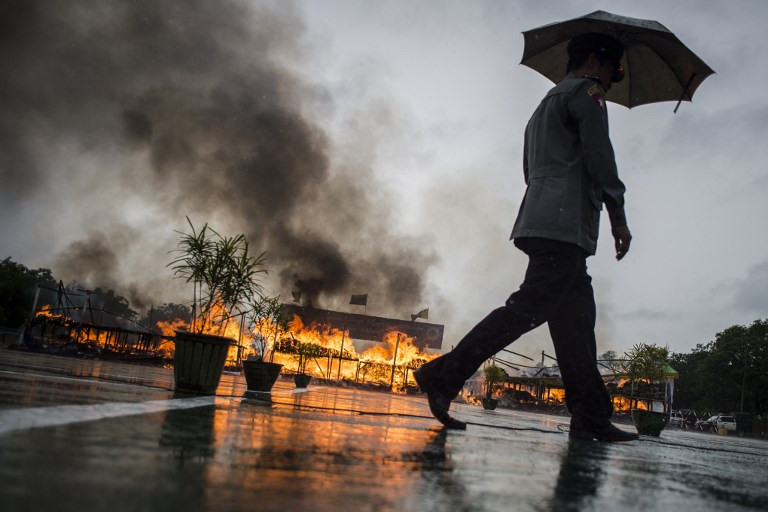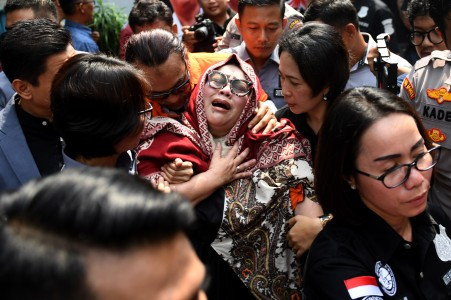Popular Reads
Top Results
Can't find what you're looking for?
View all search resultsPopular Reads
Top Results
Can't find what you're looking for?
View all search resultsPandemic could put people at greater risks from illicit drug trade: UNODC
The UNODC World Drug Report 2020, released to coincide with the International Day Against Drug Abuse and Illicit Trafficking, warns the world's countries against taking the same approach to tackling the illicit drug trade during the COVID-19 pandemic as they did during the 2008 financial crisis.
Change text size
Gift Premium Articles
to Anyone
T
he pandemic could change the future of the drug market for the worse, warns the annual United Nations report on drug use and intervention recommendations.
The UN Office on Drugs and Crime (UNODC) World Drug Report 2020, published on June 25, shows that the health crisis and attendant economic downturn could lead to greater vulnerability among the poor and disadvantaged to drug use and the illicit drug trade.
"The impact of the COVID-10 pandemic [on drug markets] is unknown and hard to predict, but it could be far-reaching," the UNODC cautions in its executive summary, which compares the pandemic's potential impact to that of the 2008 financial crisis.
“COVID-19 is going to leave youths jobless. If people are losing jobs, they are more vulnerable to organized crime, [...] illicit trafficking, and being dragged into an illicit economy. Because joblessness and poverty put a lot of pressure on people,” UNODC executive director Ghada Fathi Waly said at a teleconference on Thursday.
Published to coincide with June 26, the International Day Against Drug Abuse and Illicit Trafficking, the report is a wake-up call for many countries. It urges them to continue to clamp down on the illicit drug trade within their borders and to continue providing prevention and rehabilitation programs during the pandemic.
According to UNODC data, the world had an estimated 269 million drug users in 2018, or 5.3 percent of the global population and an increase from the 210 million users recorded in 2009. Adolescents and young adults comprised the largest proportion of drug users.
On the supply side, COVID-19 restrictions on movement could force producers "to seek out new ways to manufacture drugs" and traffickers to find new routes and methods, said the UNODC.
"Border and other restrictions linked to the pandemic have already caused shortages of drugs on the street, leading to increased prices and reduced purity," it said in the press release accompanying the report's publication.
Countries have already reported drug shortages, which could have negative health consequences for people with drug use disorders as they search for more harmful alternatives while treatment services are hobbled during lockdowns.
But the measures implemented to prevent the spread of COVID-19 are having a mixed impact on drug trafficking in different regions.
In Southeast Asia, COVID-19 restrictions had less impact on drug trafficking, as the region’s most widely consumed drug, methamphetamine, was locally produced and used, UNODC statistics and survey chief Angela Me said during the teleconference.
Read also: Crystal meth now cheaper, 'stronger' in Indonesia as drug busts rise: UN report
In Indonesia, disruption to the illicit supply chain due to COVID-19 had forced some users to switch to other drugs, while others had started to produce their own low-quality, high-risk alternative drugs, said National Narcotics Agency (BNN) head Heru Winarko.
Heru told The Jakarta Post on Thursday, however, that the agency was not facing any significant hurdles in tackling drug abuse and trafficking during the health crisis, thanks to its many partnerships.
For example, it has partnered with ride-hailing companies Gojek and Grab on gathering information regarding any suspicious deliveries, particularly as online deliveries have been on the rise as air and sea transportation tighten their surveillance during the pandemic.
It is also working with other countries in exchanging information on drug trafficking and conducting joint operations.
Cross-border cooperation is vital, since Asia is home to the Golden Triangle (Laos, Thailand and Myanmar) and the Golden Crescent (Afghanistan, Iran and Pakistan), two centers of illicit drug production.
To mark the International Day Against Drug Abuse, BNN is launching on Friday an online portal for one-stop BNN services, which includes facilities to report drug abuse and obtain legal consultations and drug tests.
“Drugs are not an option for healing. Stay away from drugs,” urged Heru, who also expressed his optimism that the number of drug users would not rise during the epidemic.
Equal treatment: Drug convict Tri Retno "Nunung" Prayudati cries while her husband July Jan Sambiran holds her, during a press conference on July 22, 2019 at the Jakarta Police headquarters. Nunung was found guilty of drug abuse in November and sentenced to 1.5 years in rehabilitation. (Antara/Akbar Nugroho Gumay)Indonesia has some of the toughest drug laws in Southeast Asia, as it is the region's largest market for narcotics. It is also a strategic transit country for drug traffickers due to its proximity to the Golden Triangle and foreign markets like Australia.
Because drug use and trafficking is regarded as both a criminal and moral issue, the Indonesian judiciary and law enforcement have extensive public and government support for taking a harsh punitive approach, even though this has earned the country wide criticism over its human rights violations.
Law No. 35/2009 on narcotics, which carries the death penalty, maintains the criminalization of drug use and makes little distinction between drug traffickers and drug users.
Read also: Imprisonment does more harm than good for drug users
Rights organizations have long lambasted criminal punishment for drug use, especially for medicinal purposes, as they deem the measure ineffective in combating drug abuse and trafficking.
In one recent case, the Kupang District Court in East Nusa Tenggara sentenced Reyndhart Rossy Siahaan to 10 months in prison for using cannabis as an alternative medicine to treat spinal cord compression.
As with the UNODC report, program manager Bambang Sulistyo of AKSI Keadilan, which provides support for drug users, expected that increased stress during the epidemic and its impacts would likely cause a spike in drug use, particularly as drugs were still available in the domestic black market and the nation's prisons.
Bambang called the government to take control of the supply chain and legalize drugs for medicinal and recreational purposes with strict conditions, as criminalizing drug use would only burden the country's overcrowded prisons.
"We hope that as the authorities commemorate the International Day Against Drug Abuse and Illicit Trafficking, they will also try to look through other lenses," said Bambang.
"They never see how mothers cry their hearts out and sell everything they can to keep their child out of prison. They never see the children whose fathers are in jail [for drugs]. They never see the women who are left on their own [because] their husbands are in prison," he said.











